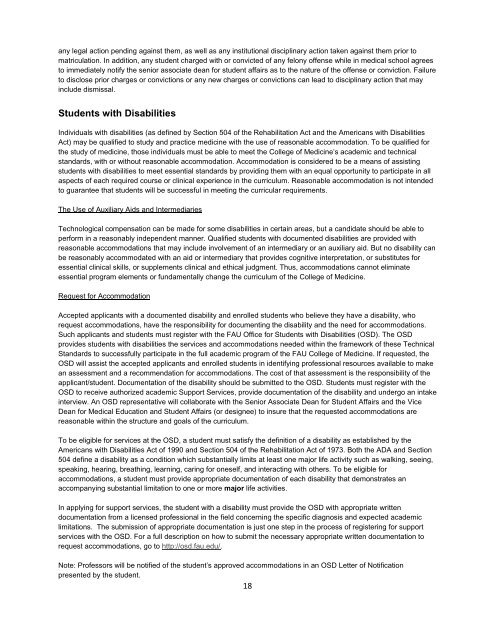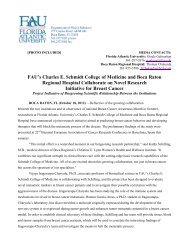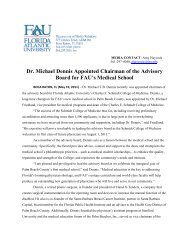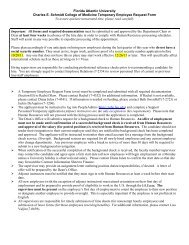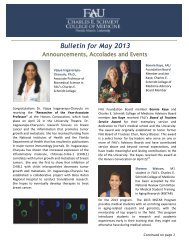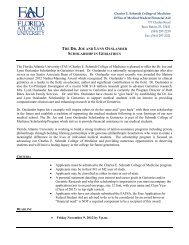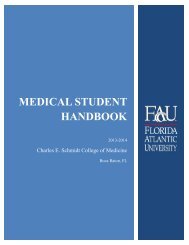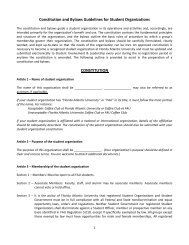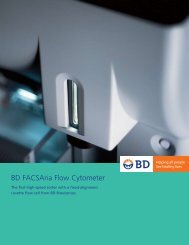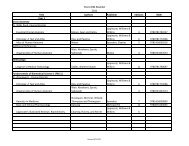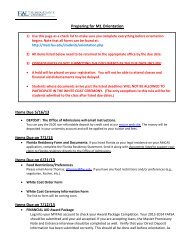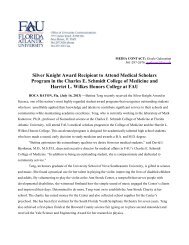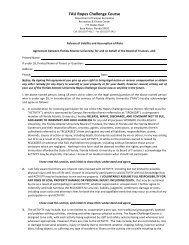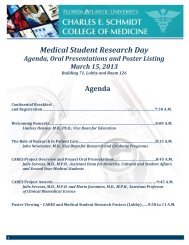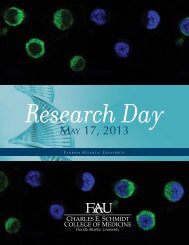Medical student handbook - College of Medicine - Florida Atlantic ...
Medical student handbook - College of Medicine - Florida Atlantic ...
Medical student handbook - College of Medicine - Florida Atlantic ...
- No tags were found...
You also want an ePaper? Increase the reach of your titles
YUMPU automatically turns print PDFs into web optimized ePapers that Google loves.
any legal action pending against them, as well as any institutional disciplinary action taken against them prior tomatriculation. In addition, any <strong>student</strong> charged with or convicted <strong>of</strong> any felony <strong>of</strong>fense while in medical school agreesto immediately notify the senior associate dean for <strong>student</strong> affairs as to the nature <strong>of</strong> the <strong>of</strong>fense or conviction. Failureto disclose prior charges or convictions or any new charges or convictions can lead to disciplinary action that mayinclude dismissal.Students with DisabilitiesIndividuals with disabilities (as defined by Section 504 <strong>of</strong> the Rehabilitation Act and the Americans with DisabilitiesAct) may be qualified to study and practice medicine with the use <strong>of</strong> reasonable accommodation. To be qualified forthe study <strong>of</strong> medicine, those individuals must be able to meet the <strong>College</strong> <strong>of</strong> <strong>Medicine</strong>’s academic and technicalstandards, with or without reasonable accommodation. Accommodation is considered to be a means <strong>of</strong> assisting<strong>student</strong>s with disabilities to meet essential standards by providing them with an equal opportunity to participate in allaspects <strong>of</strong> each required course or clinical experience in the curriculum. Reasonable accommodation is not intendedto guarantee that <strong>student</strong>s will be successful in meeting the curricular requirements.The Use <strong>of</strong> Auxiliary Aids and IntermediariesTechnological compensation can be made for some disabilities in certain areas, but a candidate should be able toperform in a reasonably independent manner. Qualified <strong>student</strong>s with documented disabilities are provided withreasonable accommodations that may include involvement <strong>of</strong> an intermediary or an auxiliary aid. But no disability canbe reasonably accommodated with an aid or intermediary that provides cognitive interpretation, or substitutes foressential clinical skills, or supplements clinical and ethical judgment. Thus, accommodations cannot eliminateessential program elements or fundamentally change the curriculum <strong>of</strong> the <strong>College</strong> <strong>of</strong> <strong>Medicine</strong>.Request for AccommodationAccepted applicants with a documented disability and enrolled <strong>student</strong>s who believe they have a disability, whorequest accommodations, have the responsibility for documenting the disability and the need for accommodations.Such applicants and <strong>student</strong>s must register with the FAU Office for Students with Disabilities (OSD). The OSDprovides <strong>student</strong>s with disabilities the services and accommodations needed within the framework <strong>of</strong> these TechnicalStandards to successfully participate in the full academic program <strong>of</strong> the FAU <strong>College</strong> <strong>of</strong> <strong>Medicine</strong>. If requested, theOSD will assist the accepted applicants and enrolled <strong>student</strong>s in identifying pr<strong>of</strong>essional resources available to makean assessment and a recommendation for accommodations. The cost <strong>of</strong> that assessment is the responsibility <strong>of</strong> theapplicant/<strong>student</strong>. Documentation <strong>of</strong> the disability should be submitted to the OSD. Students must register with theOSD to receive authorized academic Support Services, provide documentation <strong>of</strong> the disability and undergo an intakeinterview. An OSD representative will collaborate with the Senior Associate Dean for Student Affairs and the ViceDean for <strong>Medical</strong> Education and Student Affairs (or designee) to insure that the requested accommodations arereasonable within the structure and goals <strong>of</strong> the curriculum.To be eligible for services at the OSD, a <strong>student</strong> must satisfy the definition <strong>of</strong> a disability as established by theAmericans with Disabilities Act <strong>of</strong> 1990 and Section 504 <strong>of</strong> the Rehabilitation Act <strong>of</strong> 1973. Both the ADA and Section504 define a disability as a condition which substantially limits at least one major life activity such as walking, seeing,speaking, hearing, breathing, learning, caring for oneself, and interacting with others. To be eligible foraccommodations, a <strong>student</strong> must provide appropriate documentation <strong>of</strong> each disability that demonstrates anaccompanying substantial limitation to one or more major life activities.In applying for support services, the <strong>student</strong> with a disability must provide the OSD with appropriate writtendocumentation from a licensed pr<strong>of</strong>essional in the field concerning the specific diagnosis and expected academiclimitations. The submission <strong>of</strong> appropriate documentation is just one step in the process <strong>of</strong> registering for supportservices with the OSD. For a full description on how to submit the necessary appropriate written documentation torequest accommodations, go to http://osd.fau.edu/.Note: Pr<strong>of</strong>essors will be notified <strong>of</strong> the <strong>student</strong>’s approved accommodations in an OSD Letter <strong>of</strong> Notificationpresented by the <strong>student</strong>.18


